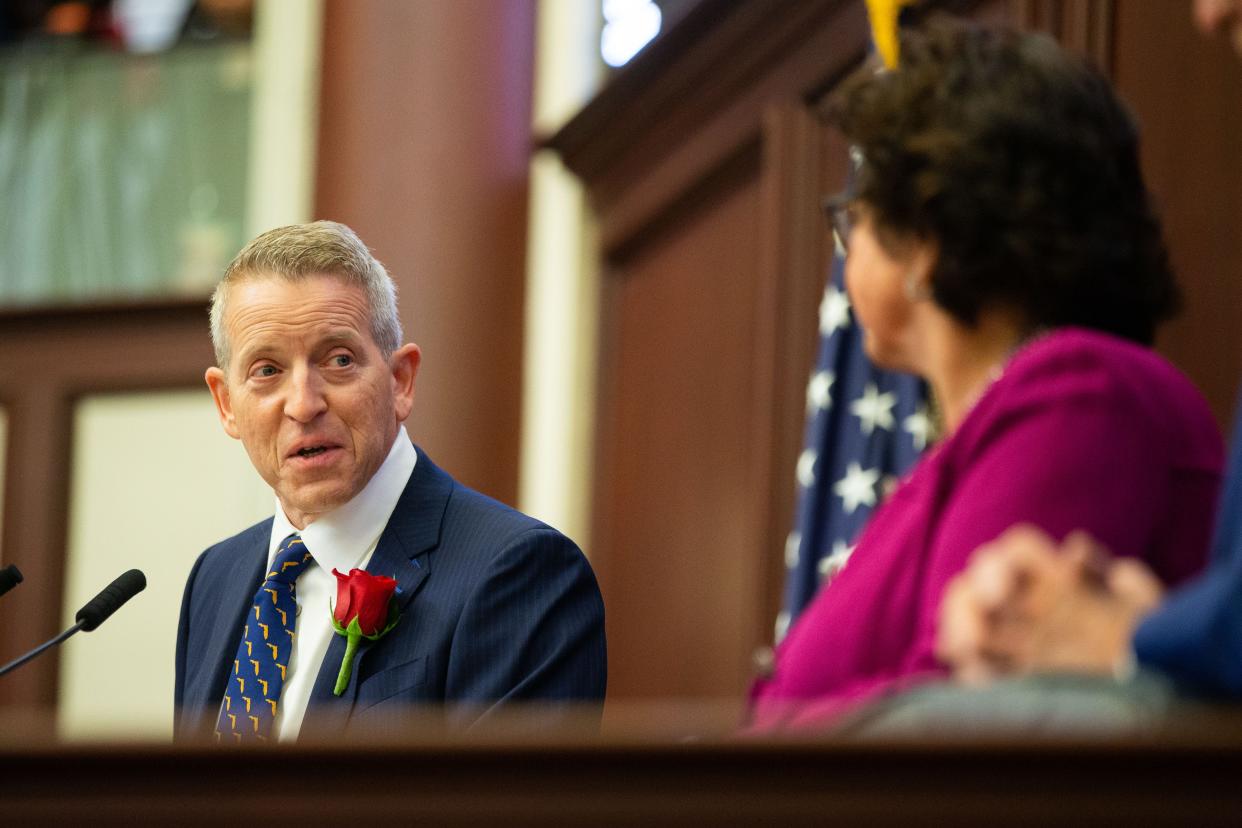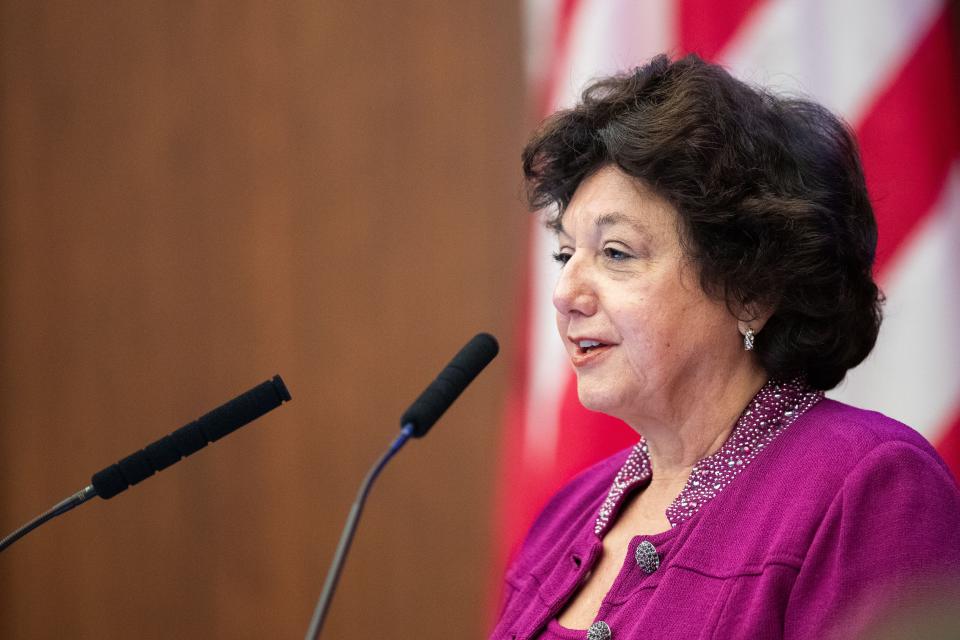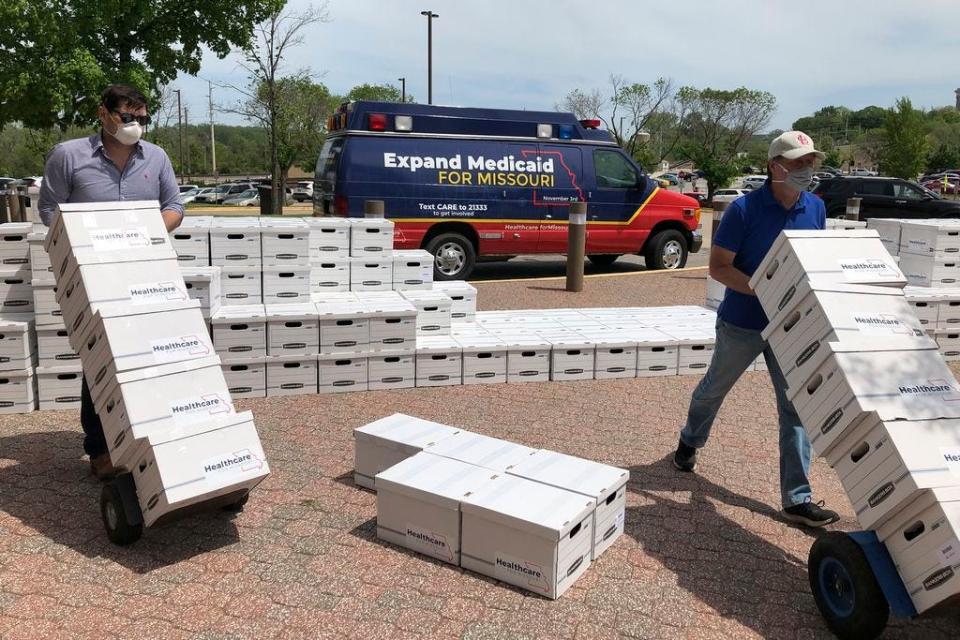2024 Session: Health care a driving issue — but don't talk about Medicaid expansion

- Oops!Something went wrong.Please try again later.
- Oops!Something went wrong.Please try again later.
TALLAHASSEE — Florida lawmakers are poised to spend much of the two-month legislative session focusing on health care, improving patient access and expanding the state’s medical work force.
What they won’t talk about is expanding Medicaid under the federal Affordable Care Act.
Florida Republican leaders opened the 2024 Legislature vowing to continue a decade-long stiff-arming of a program which has allowed millions of uninsured, lower-income Americans gain health coverage in 40 states and Washington, D.C.
Republicans command legislatures in the 10 states, including here, refusing expansion. But the Sunshine State, with 2.5 million uninsured, also has one of the nation’s highest shares of residents without health coverage.
“I do think that Florida and Texas are going to be last to take up Medicaid expansion," said Arielle Kane, director of Medicaid initiatives for Families USA, a national health advocacy organization. "But I’d love to be wrong.”
Turning back coverage — and federal dollars
In turning back a program that could bring health coverage to roughly 1 million Floridians, Gov. Ron DeSantis and Republican supermajorities in the House and Senate also are rejecting about $5.6 billion in federal aid which would come in the first two years of expansion, and about $4.4 billion annually after that.
Florida taxpayers’ share of expansion would run about $200 million a year, analysts have said. A family of four, earning $41,400 a year – or 138% of the federal poverty level – could qualify for health insurance under an expansion.
While Floridians in that income bracket are poor, many are working in service-industry jobs that drive the state’s polarized, tourism-driven economy.
But also covered would be unemployed single people, a provision which antagonizes Republican leaders.
“I could be sitting at home as a 40-year-old, living with my parents playing Xbox and I should be able to knock on your door and say ‘pay my health insurance because health care is a right. You owe me'?" said House Speaker Paul Renner, R-Palm Coast.
Instead, Renner said the state has approached health coverage “the right way.” It expanded income limits last year for families to qualify for Florida KidCare subsidized health insurance, while many employed Floridians can afford coverage under one of the health plans also available under the Affordable Care Act, also known as Obamacare.
“We can’t give all things to all people, and if it’s not a true safety net, it goes back to (former British prime minister) Margaret Thatcher’s saying that the great problem with socialism is that eventually, you run out of other people’s money,” he added.
Renner says expansion 'dead on arrival'
Renner said Medicaid expansion is “dead on arrival,” but “not due to a lack of consideration.”
The 2.5 million Floridians lacking health insurance represent a much higher rate than the national average. Most earn too much money to qualify for the state’s traditional, low-income Medicaid coverage, but still fall below the poverty level and can’t afford an Obamacare policy.
DeSantis, during a September Republican presidential debate, struggled to explain why so many people in his state are uninsured, attempting to blame it on inflation. Floridians without insurance comprise 11% of the state’s population, according to the U.S. Census Bureau.
Only Georgia, Texas and Wyoming – also states in which Medicaid expansion has been rejected – have a higher percentage of uninsured.
“We want to join the many states, Republican-included, that have expanded Medicaid to make sure that every Floridian can be covered,” said Rep. Dotie Joseph, D-North Miami, echoing a call Florida Democrats have been making for a decade, since expansion began under then-President Barack Obama.
Former Florida Gov. Rick Scott, now a U.S. senator, blocked expansion efforts during his years as the state’s chief executive. DeSantis followed suit. This year, GOP legislative leaders took the idea off the table on the very first day of session.
The closest Florida ever got to embracing the program was in 2015, when a bipartisan expansion plan was endorsed by the state Senate, but it was defeated by a political tag-team of Scott and the House.

'Live Healthy' is Senate's focus
This year, Passidomo is bringing health care into focus by advancing a signature “Live Healthy” proposal.
The $800 million package of initiatives is aimed at adding more people to the health care workforce, train more doctors and keep them in Florida, and make more lower-income Floridians eligible for health care in low-cost or free clinics, keeping them out of emergency rooms.
After an expansion question from the Democratic side of the aisle, the measure won approval Thursday on a 39-0 vote and was sent to the House, which has signaled it will back the effort later in session.
Robin Rudowitz, director of the Program on Medicaid and the Uninsured at KFF, a health policy research organization, said many states are enacting initiatives dealing with a worker shortage in hospitals and other health care settings.
Workforce steps and expansion can be done at same time, expert says
But that shouldn’t rule out Medicaid expansion: “Many states are struggling with workforce issues,” Rudowitz said. “But many states can do both things.”
Passidomo, though, dismissed any talk of Medicaid expansion, even though the idea continues to bubble in nearby states which remain holdouts – Georgia, Mississippi and Alabama.
North Carolina became the 40th state to expand Medicaid last year, with that state’s Republican-controlled Legislature approving the step.
“Medicaid expansion is not going to happen,” Passidomo said in her session-opening address to the Florida Senate. “It is not a quick fix. It is not a panacea. In fact, if you cannot actually schedule an appointment with a health care provider, Medicaid expansion is nothing more than a false government promise.”
LIke Renner, Passidomo told reporters that she disagreed with the underlying approach of the program.
Medicaid expansion "is not working. It’s billions and billions of dollars, as opposed to what we’re doing now, which is, grow the work force to get the underserved served," she said.
“It’s common sense,” Passidomo added. “It’s not political.”
Watch for this during session: 5 things to watch when Florida lawmakers gather at the Capitol, from defectors to re-do's
When Medicaid expansion once was debated Florida Medicaid expansion passes Senate, faces dead end in House

Can't take politics out of Obamacare
But it seems that politics cannot be removed from Obamacare.
Republicans in Congress finally pivoted away from campaigning against Obamacare in advance of the 2022 elections, after suffering a backlash four years earlier for trying to undo popular elements like protecting people with pre-existing conditions.
Donald Trump ran on repealing Obamacare in winning the 2016 presidential campaign — and in losing his 2020 re-election bid.
This year, Trump again is campaigning for the White House committing to abolish Obamacare. At the same time, a record number of people have signed up for health policies under the program, and the law draws high favorability ratings among voters.
DeSantis, far behind Trump in polls, also promises to “replace and supersede” Obamacare with a “better plan.”
In the Florida House, there was a glimmer of expansion talk last fall when one GOP lawmaker broke ranks and said it was time for the state to move past its long refusal.
But clearly Rep. Joel Rudman, a doctor and conservative Republican from Navarre, has been unable to bring leadership along.
“The politics does get involved. But as a physician, I don’t believe health care should be partisan,” Rudman said at the time.
More: Dr. Rock in the House: Meet Joel Rudman, the Florida legislator 'Breaking the Law' in pleather pants
John Kennedy is a reporter in the USA TODAY Network’s Florida Capital Bureau. He can be reached at jkennedy2@gannett.com, or on Twitter at @JKennedyReport
This article originally appeared on Tallahassee Democrat: Medicaid expansion again off the table for Florida GOP leaders

